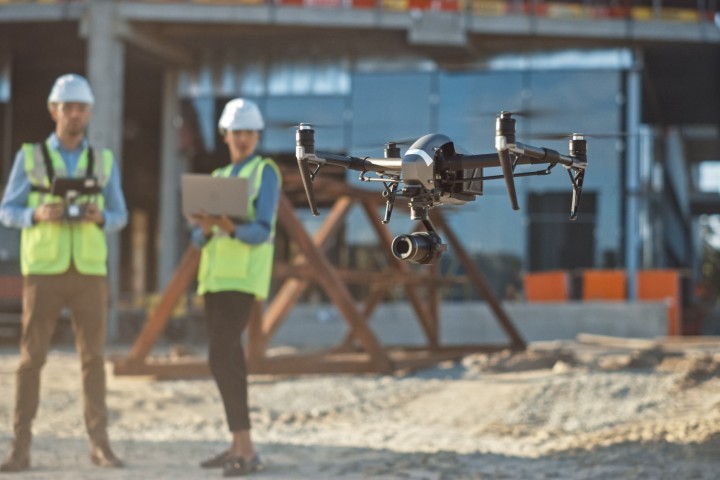Drones, also known as Unmanned Aerial Vehicles (UAVs), have swiftly emerged as a disruptive technology with the potential to revolutionise various industries. From agriculture and construction to logistics and surveillance, drones offer unique advantages that can significantly benefit businesses.
ADVANTAGES OF DRONES IN BUSINESS
1. Increased Efficiency and Productivity
Drones have the ability to perform tasks faster and more efficiently than traditional methods. For example, in agriculture, drones equipped with high-resolution cameras and sensors can monitor crops, identify diseases, and assess crop health over large areas in a fraction of the time it would take humans to cover the same terrain. This increased efficiency allows businesses to save valuable time and resources, ultimately leading to improved productivity.
2. Cost Savings
By streamlining operations and reducing manual labour, drones can significantly cut costs for businesses. In sectors like construction and infrastructure, drones can conduct surveys and inspections, eliminating the need for expensive manned operations. Additionally, drones can be used for last-mile deliveries, saving costs in the logistics industry. These cost-saving benefits make drones an attractive investment for businesses of all sizes.
3. Enhanced Safety
In hazardous environments such as mining sites or disaster-stricken areas, using drones can eliminate risks to human lives. Drones can access hard-to-reach locations, assess structural integrity, and provide real-time data without putting human lives at risk. This enhanced safety feature is a game-changer for industries dealing with dangerous work conditions.
4. Real-Time Data and Analytics
Drones equipped with advanced sensors and cameras can capture real-time data and provide valuable insights to businesses. For example, in the retail industry, drones can monitor foot traffic and customer behaviour within stores, helping retailers optimise their layouts and marketing strategies. Real-time data analysis empowers businesses to make data-driven decisions and stay ahead of the competition.
5. Improved Inventory Management
In warehouses and distribution centres, drones can automate inventory management processes. They can efficiently count and track inventory, reducing the chances of errors and stockouts. This level of automation ensures that businesses maintain optimal inventory levels and avoid unnecessary carrying costs.
6. Precision Agriculture
In the agricultural sector, drones have revolutionised farming practices through precision agriculture. Drones equipped with sensors can assess crop health, monitor soil conditions, and even apply targeted fertilisers and pesticides. This precision approach optimises crop yields, conserves resources, and promotes sustainable farming practices.
7. Faster and Eco-Friendly Deliveries
Drones have the potential to revolutionise the delivery industry by offering faster and more eco-friendly transportation options. By using drones for last-mile deliveries, businesses can reduce delivery times and minimise their carbon footprint, contributing to environmental sustainability.
8. Surveillance and Security
The security industry has benefited significantly from drone technology. Drones equipped with high-definition cameras can conduct surveillance over large areas, enhancing security measures and deterring criminal activities. In addition, drones can be used for search and rescue operations, locating missing persons in vast and remote locations.
9. Infrastructure Inspection
Inspecting critical infrastructure such as bridges, power lines, and pipelines can be time-consuming and costly. Drones can streamline these inspection processes by accessing difficult-to-reach areas and capturing detailed imagery. This proactive approach to infrastructure inspection helps businesses identify potential issues before they escalate into major problems.
10. Creative Marketing and Advertising
The use of drones in marketing and advertising has opened up new and exciting possibilities. Aerial drone shots can capture breathtaking views and create captivating visual content for promotional campaigns. Businesses can leverage these eye-catching visuals to engage their audience and leave a lasting impression.
11. Efficient Surveying and Mapping
In the field of land surveying and mapping, drones have revolutionised the way data is collected. Traditional surveying methods can be time-consuming and labour-intensive, whereas drones can quickly and accurately map large areas with high precision. This benefit is especially valuable in urban planning and construction projects.
12. Precision Inspection in Agriculture
Drones equipped with LIDAR technology can accurately measure plant height and canopy structure, providing valuable data for precision agriculture. This level of precision enables farmers to make informed decisions regarding irrigation, fertilisation, and pest control, leading to optimal crop health and increased yields.
13. Monitoring Environmental Changes
Drones have become valuable tools in environmental monitoring and conservation efforts. They can monitor deforestation, track wildlife, and assess environmental changes over time. This data aids scientists and policymakers in understanding the impact of human activities on the environment and implementing appropriate conservation measures.
14. Efficient Construction Site Management
In the construction industry, managing large construction sites can be complex. Drones can provide real-time aerial footage of construction progress, enabling project managers to monitor the site efficiently. This data can be used to identify bottlenecks, optimise workflows, and ensure that projects stay on track and within budget.
15. Rapid Disaster Response
During natural disasters and emergencies, drones can be quickly deployed to assess damage and identify areas in need of assistance. The ability to access disaster-stricken areas rapidly allows relief organisations to provide aid and support more effectively.
16. Remote Inspections in Energy Sector
In the energy sector, drones are used to inspect wind turbines, solar panels, and oil rigs. These remote inspections reduce maintenance costs and downtime, ensuring that energy production remains efficient and uninterrupted.
17. Aerial Surveillance for Law Enforcement
Law enforcement agencies utilise drones for aerial surveillance, crowd monitoring, and search operations. Drones provide law enforcement with critical data that aids in crime prevention and public safety.
18. Drones in Entertainment Industry
The entertainment industry has also embraced drone technology for creating stunning aerial shots in movies, documentaries, and music videos. Drones provide filmmakers with unique perspectives and enable them to capture breathtaking visuals.
19. Precision Applications in Mining
In the mining industry, drones can be used for precise geological surveys and stockpile measurements. This data helps mining companies optimise their operations and improve resource management.
20. Drones in Insurance Claims Processing
In the insurance sector, drones facilitate quick and accurate assessment of property damage, making the claims process more efficient and transparent.
21. Supporting Scientific Research
Researchers in various fields, including wildlife biology and ecology, use drones to study and observe wildlife behaviour and habitats.
22. Monitoring and Maintenance of Pipelines
Drones are used to inspect and monitor oil and gas pipelines, ensuring safety and detecting potential leaks or damages.
23. Enhanced Monitoring of Remote Areas
Drones enable monitoring and data collection in remote and inaccessible areas, aiding in research and conservation efforts.
24. Precision Delivery of Medical Supplies
In remote or disaster-stricken regions, drones can deliver essential medical supplies quickly and efficiently.
25. Innovative Disaster Preparedness
Drones assist in disaster preparedness by providing real-time data and enabling simulations for emergency response training.
Drones have emerged as a transformative technology with immense business benefits across various industries. From improved efficiency and cost savings to enhanced safety and real-time data analytics, drones are revolutionising the way businesses operate. Embracing drone technology allows companies to gain a competitive edge, streamline operations, and explore new opportunities for growth.
As the drone industry continues to evolve, businesses must stay informed about the latest developments and regulations to harness the full potential of this cutting-edge technology. With responsible and strategic drone implementation, businesses can soar to new heights and unlock a world of possibilities.




















